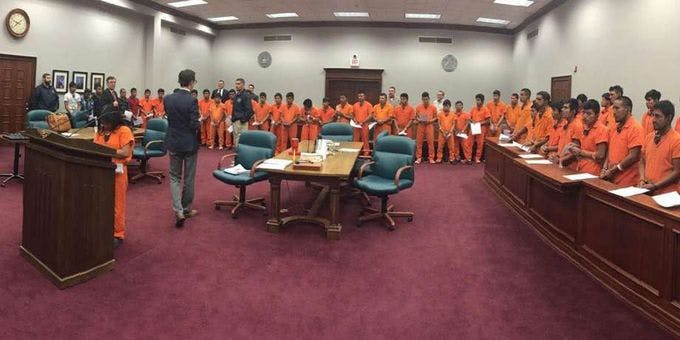Zero Tolerance Is The Problem
House Republicans want to help Trump put children behind bars
by Chris Thomas

Deep at the core of everything wrong with the Trump administration’s approach to immigration and the horrific, heartbreaking consequences of that approach, is zero-tolerance.
Zero tolerance was a cornerstone of then-candidate Trump’s immigration policy. That policy was put into force by Attorney General Jeff Sessions back in May. Sessions inaugurated the change with a speech, stating “I have put in place a zero-tolerance policy for illegal entry on our south-west border,” and promising that, “if you cross this border unlawfully, then we will prosecute you.” Sessions even went so far as to call attention to the fact that children would be separated from the adults with whom they were traveling.
But as with most issues involving multiple countries, numerous law enforcement agencies, and tens of thousands of people, the reality is more complicated than a brief speech or a bumper-sticker policy pledge.
Zero Tolerance for Asylum
Many of the people crossing the border fear for their lives. Under the previous policies of a previous president migrants who had a legitimate fear of persecution or harm in their home countries would be referred to the asylum system rather than criminally prosecuted. Better than 99% of those so-referred made their court dates and, in many cases, asylum was granted. If fear of MS-13 is reason enough to enforce a zero-tolerance policy, after all, it’s also reason enough to claim asylum.
So migrants have been largely denied access to the asylum programs, instead facing criminal prosecution. While migrants facing prosecution could be placed on house arrest, fitted with ankle bracelets, or otherwise tracked in numerous other ways, the Department of Justice prefers to incarcerate them.
Zero Tolerance for Families
Problematically, Immigration and Customs Enforcement (ICE) maintains just under 3,500 beds in just three family detention centers. In any given month several times that number of families**,** not individuals—families, are apprehended by ICE. There’s just not room for these families in the family detention centers.
So ICE made the decision to separate families. They circumvented the cap on family beds by housing the children and their parents separately while the parents awaited prosecution. The new, more aggressive policies resulted in a 32% increase in arrests and the immigration court systems, which were already overwhelmed, were predictably swamped.
Zero Tolerance for Due Process
So ICE started running immigration courts like this:

Public defenders only have minutes to meet with each of the defendants. When a judge asks a question, the entire room must often answer in unison to save time. Many of the migrants have no clue where their children are.
“It feels like an assembly line,” [one reporter] said. “It’s a mass production of guilty pleas.”
Those “guilty” pleas allow for immediate deportation but even running at full capacity, the courts are getting further and further behind. Backed into a corner by the groundswell of outrage over the treatment of migrant children, President Trump relented last week, signing an executive order requiring that children no longer be separated from their parents in the course of immigration proceedings.
Zero Tolerance for Children
That order conflicts with the Flores Settlement, a longstanding bit of U.S. case-law that caps how long the U.S. government can hold a child in custody. Under Flores, children must be placed with a sponsor or relative within 20 days but under Trump’s order those same children can’t be separated from their parents, who would still be in U.S. custody pending the charges against them.
And so the House Republicans have begun circulating a bill which will allow the federal government to detain children beyond the 20-days currently allowed under U.S. law. Note that this is distinct from the “compromise” legislation on immigration due — and expected to fail — on the House floor in late June/early July.
Faced with terrified asylum seekers, overflowing family detention centers, a public incensed over children torn from their mother’s arms, and mass trials, the GOP is doubling down on the prospect of indefinite detention for children.
Democrats, reportedly, have zero tolerance for the proposal.
Tell Congress What You Think
While the GOP hasn’t been able to find internal agreement on their larger immigration bill, a repeal of the Flores Agreement could draw much broader support from within the party. You can write to your Representatives and Senators by sending the word Resist to Resistbot on Facebook Messenger, Telegram, or as a Twitter direct message. If none of those work for you, Resistbot also supports old fashioned SMS: text RESIST to 50409 to get started. It takes 2 minutes to make a difference.
Support the ’bot!
Upgrade to premium for AI-writing, daily front pages, a custom keyword, and tons of features for members only. Or buy one-time coins to upgrade your deliveries to fax or postal mail, or to promote campaigns you care about!
Upgrade to PremiumBuy Coins